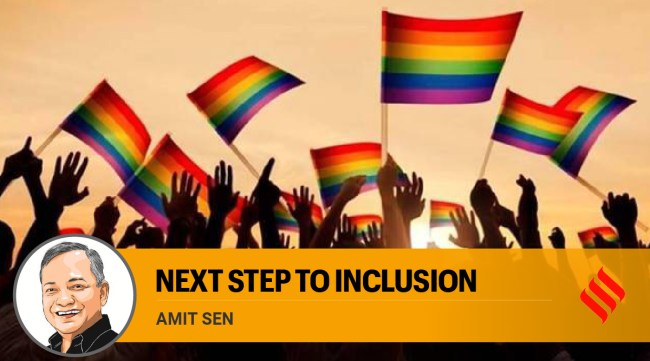Opinion Same-sex marriage: The only natural and just way forward
The upcoming Supreme Court hearing is a positive and much-needed step
 Legalising same-sex marriage may pave the way for generations to come and become a big step towards reclaiming the diverse, multicultural, and inclusive civilisation we always have been, writes Amit Sen. (Representational Photo)
Legalising same-sex marriage may pave the way for generations to come and become a big step towards reclaiming the diverse, multicultural, and inclusive civilisation we always have been, writes Amit Sen. (Representational Photo) Ten years ago, a senior government officer came to see me, devastated since the time their 15-year-old son had announced at home that he was gay. He was convinced that this was the consequence of sending his son to a “progressive and permissive school”, and implored me to “brainwash” his child and bring him back to “normalcy”. Parthiv (name changed) had been cutting himself with a blade, in anguish and frustration, for two years before I saw him, and came out to his parents when he could not tolerate it anymore. The shock and disgust that he saw on his parents’ faces drove him to take a massive overdose of tablets lying at home, which almost took his life.
Parthiv would have died had his older sister not found him in time and rushed him to the hospital. Such tragic consequences in young people who become aware of their different sexual orientation, often at puberty, is not uncommon. Initially, the confusion caused by the normative cultural context, followed by shame and humiliation under the gaze of the judgemental and flagellating social circles, the suffering can become endless. A significant number of young people come to us initially with varied mental health conditions, including depression, anxiety disorders, an eating disorder, or substance misuse. But as time goes by and the therapeutic space begins to feel safe, they start sharing the deep-seated discomfort with their bodies they might have carried for years, perhaps the dissonance they feel with their prescribed gender or perplexity about their sexual urges and attraction. It takes a big weight off their fragile shoulders once they are able to articulate the inner turmoil, which often starts the process of healing and may even provide symptomatic relief from the conditions they are first presented with. Needless to say, the young ones who are accepted and integrated by their families and peer groups have a much better chance of healing, becoming who they want to be, and leading a fulfilling and productive life.
Parthiv and his parents, who had gone through their journey of reconciliation, considered themselves fortunate when homosexuality was decriminalised five years ago. Although they still couldn’t talk about it openly to everybody, the knowledge no longer plagued them like a “shameful secret”. They learnt to accept it once they realised that for their son it was not a choice but non-negotiable. When the Supreme Court read down Section 377 of the IPC in September 2018, there was widespread relief and rejoicing, and not just amongst the LGBTQIA+ community. The tens and thousands of people who had been hounded and ostracised from society for decades were now accepted and included in the larger community. Overnight, they could make choices that had been forbidden up until then and could see the possibility of forging an identity that sat comfortably with their natural disposition, without ignominy or embarrassment. Although a change in law does not always guarantee social change, this one served as a tectonic shift that caused widespread attitudinal changes across various sociocultural domains and institutions. In schools and colleges, public places and social gatherings, one could see a broadening and flowering of gender, relational and personal expressions, which are at once refreshing and cathartic. In our work with young people’s mental health and development, we have seen the preventive and healing effects of such emerging open spaces.
So where do we go from here in our endeavour to accept, include and integrate a community, a significant minority, that has been ruthlessly marginalised and hounded for decades, perhaps centuries? What would be the logical progression if we were to see them from the lens of human rights; the right to healthcare and education, the right to property and inheritance, the right to have a family and children, and the right to enjoy marital privileges? Indeed, if we truly consider them as equals who deserve the same rights and opportunities as others in our country, then addressing their petition for marriage appears to be the only natural and just way forward. The upcoming Supreme Court hearing about same-sex marriage is clearly a positive and much-needed step towards the same.
As would be expected in a diverse and multicultural country like ours, there are bound to be different opinions, as well as opposition, to the idea of same-sex marriage. Our government, for one, seems to have some misplaced apprehensions and aspersions about the moral compass and upbringing of children in same-gender marriages. There is a fear that children growing up in families of same-sex unions will become confused about societal norms and are much more likely to become gay themselves. While members and supporters of LGBTQIA+ would be puzzled about why that should be a problem, the fact that the whopping majority of gay people grow up in families of heterosexual parents, and often in conservative households, challenges the notion that becoming gay is shaped only by external influences, and learnt through modelling and imitation. In our experience of working with LGBTQIA+ couple families having children, both in India and abroad, we have never found patterns of social difficulties or specific mental health problems that are any different from children of heterosexual parents. On the contrary, most gay couples were more mindful and sensitive to their children’s needs and were willing to walk the extra mile as parents. New research and surveys from different countries, including some from Asia, have emphatically stated that children from same-sex couples fare just as well, if not better, than those of heterosexual couples; and that they do particularly well in the domains of emotional, social and educational development. We believe that parenting styles are no longer inherited in traditional ways in today’s world. Indeed, the rapid socio-cultural changes are necessitating mindful and creative ways of parenting. Gay couples may have the opportunity and motivation to create family structures that are innovative and relevant to our times.
Refreshingly, The Indian Psychiatric Society (IPS) has recently come out with a statement supporting and asserting that individuals from the LGBTQIA+ community, like any other citizen of our country, should enjoy all civil rights, including the right to marriage and adoption. They have emphasised that children growing up in same-gendered families should be brought up in a “gender-neutral, unbiased environment;” and “it is, therefore of utmost importance, that the family, community, school and society, in general, are sensitised to protect and promote the development of such a child.”
The hallmark of a progressive nation is reflected in its ability to accept diversity, include minorities, and integrate the marginalised. Legalising same-sex marriage may pave the way for generations to come and become a big step towards reclaiming the diverse, multicultural, and inclusive civilisation we always have been.
The writer is a senior child & adolescent psychiatrist, and director/co-founder of Children First Mental Health Institute, Delhi-NCR



